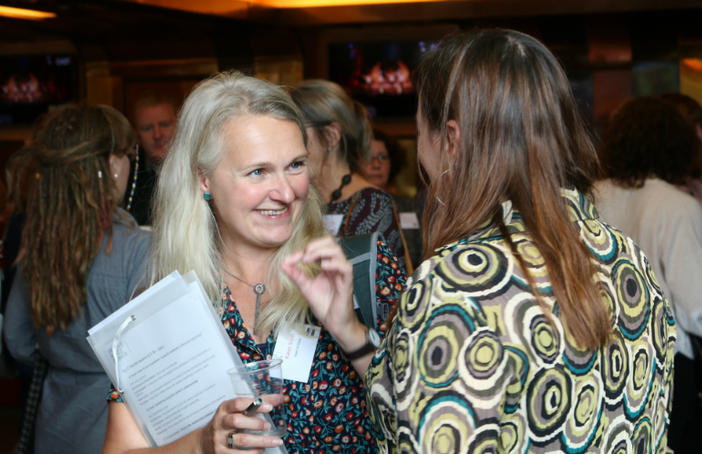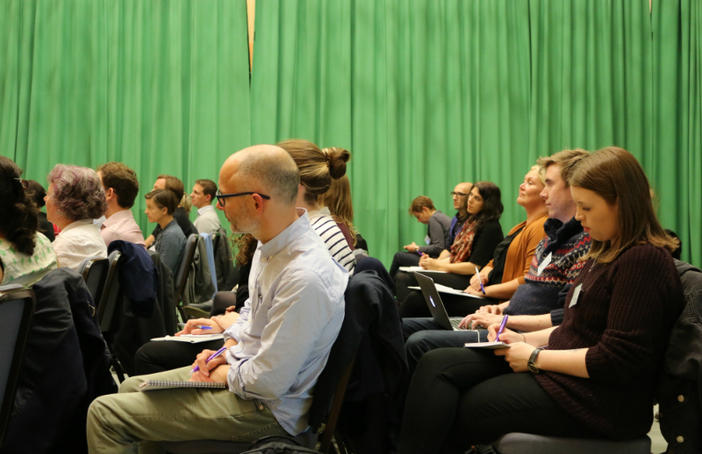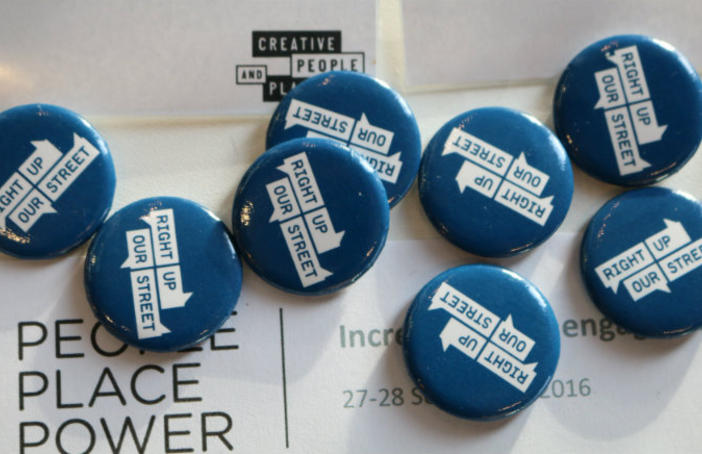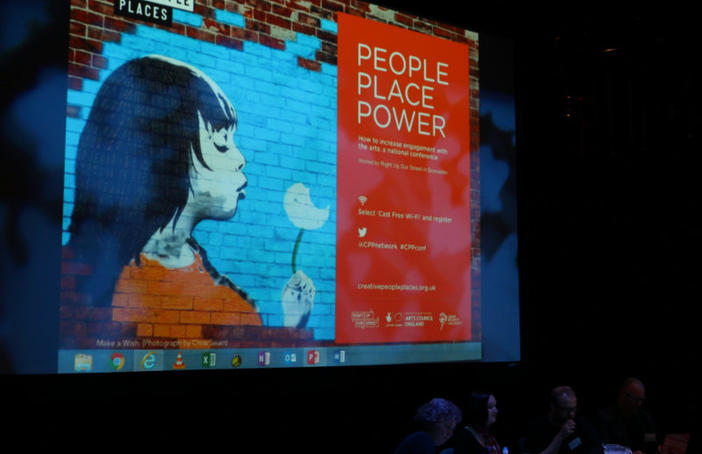Blog Post
People, Place, Power: reflections from Matt Fenton and Emma Horsman
Matt Fenton from Contact and Emma Horsman of The Cultural Spring share their reflections on our People, Place, Power conference

Matt Fenton of Contact and Emma Horsman of CPP project The Cultural Spring both attended People, Place, Power, with Matt also speaking on a panel. Here they generously share their reflections from the conference.
The Creative People and Places (CPP) national conference was, embarrassingly, my first visit to Doncaster, and to CAST. I came away fired up by much of what’s happening through the CPP programmes nationally. Their various approaches to community-led programming and commissioning, and the strong sense that the role of artistic leadership can be facilitative and empowering, rather than directional and paternalistic, felt like a massive and overdue wake-up call to many of our established models.
With the exception of myself and colleagues from the Royal Exchange (go Manchester!), there were few major building-based organisations or companies present. And it was these missing directors, execs and ADs, that I had in mind during the final panel when Guardian critic Lyn Gardner, myself, Jo Verrent of Unlimited, Sylvan Baker from People’s Palace Projects, and Jo Hunter of 64 Million Artists, spoke by way of summing up. As non-CPP members, we attempted to reflect back what we had heard, experienced and thought over the two days, and give a sense of how the ideas expressed at the conference sparked with wider practices of participatory decision-making, diverse representation, and the unlocking of individual creativity in everyone. Mainly we discussed a problem called Excellence.
The sessions I experienced during the conference evidenced a level of dialogue rarely seen in larger, building-based gatherings, and a refreshing comfortableness with discussing and learning from failure. I guess that’s the result of setting up the CPP programme as a massive nation-wide learning set. Academics and independent evaluators were very much present and, despite some anti-academic joshing, clearly integral to the gathering and sharing of learning. What was most inspiring was the sense that new methodologies, new forms of engagement, were being tested in every corner of the country, all slightly different, but most in direct response to the local characteristics and communities being engaged. The repeated theme being that CPP projects were aiming to take what was already there (a history, a landscape, an industry or its loss, local stories, nascent talent) and in collaboration with artists nurture and elevate all that – in ambition, in scale, but also in respect, in value.
What was less impressive was a seeming lack of self-awareness (expressed, anyway) about the lack of those community voices at the event, despite the beautiful welcome from Doncaster artistic hosts Right Up Our Street. I wanted to hear the people involved talk (either in person or filmed) on their own terms – though they were often cited, quoted, often represented in absentia. Likewise, the lack of visible diversity in the teams and associated research partners delivering on the programmes mainly went unchecked.
Inevitably I spent some time reflecting on the experiments in participatory programming we trialled in Lancaster at the Nuffield Theatre. In 2005 I joined Maximise (an Arts Council developed programme that asked artistic leaders to think seriously about representation and diversity), and quickly panicked about my inability ever to authentically represent anything other than my own class, race and educational background (predictable in each case) in my programming and commissioning decisions; and took a hasty year-long hiatus. What I did in reality, instinctively, was facilitate first artists, and then local residents to programme the Nuffield, to diversify our programme from within, and over time completely change our commissioning model to one directly responsive to local contexts, histories and landscapes, in collaboration with local communities and radical, risk-taking performance makers. Those early programming experiments turned out more successful artistically, and ticket-wise, than any season I had put together as the supposed expert. Lesson learnt. The project was met in the UK with amusement that I had essentially done myself out of a job, and with repeated invites to speak at conferences and festivals internationally.
I have never really gone back to programming in the old-school sense (I have a box – a theatre/festival/entire city – and I shall fill it with examples of my excellent good taste and worldliness), and now lead Contact in Manchester, perhaps the prime European example of participatory decision-making in the arts, in our case working with diverse young people as board members, and as young leaders appointing all staff, and with a significant say in core programming. As a 20-year experiment in governance (and all the things that come from that in the diversity and youthfulness of its reach, audience and programming) Contact at least shows that other leadership models, ones aligned with CPP’s increasingly mainstream ideas of artistic co-design and community-based decision-making, are tantalisingly possible.
Matt Fenton is Artistic Director and Chief Executive at Contact in Manchester
Where to begin? I’d been looking forward to the conference for a while. I didn’t go to last year’s conference as I was on maternity leave and the first CPP conference had taken place in February 2014 in Hull when we were all just starting out really. At Hull, we were only two months into our project for Cultural Spring and there seemed to be a lot of nervousness then: Were we all on the right lines? Were we doing right by the communities we serve? Only time, experiences and learning would tell and here we all were in late September 2016, with CPP projects opening up to the wider sector and sharing learning with over 200 conference attendees
I have to say, that like many of us, I’ve been to my fair share of conferences, not always happy with how useful they’ve been. People, Place Power was I thought refreshingly different in that there was a genuine openness to it - people sharing practical advice and being refreshingly honest. Perhaps that is partly due to CPP being an action learning programme; we learn just as much from what works as what doesn’t work. On the whole the sessions I attended were useful with lots of practical advice.
I thought the key note speech on the second day by Lynsey Hanley was captivating and chimed a lot with me. It made me reflect on how we approach people who don’t currently engage in arts and culture and how can we reach out to them more effectively. I don’t have the answers, but her comment that "dislikes and avoidance is a lack of confidence" provided food for thought as well as her reflections on primary and secondary education. I think I can remember one cultural visit whilst in Secondary school and an abundance in Primary school. CPP is a real opportunity to change some of that through family / wider community engagement. It was a lovely surprise that Lynsey’s last slide referenced both The Cultural Spring and the DIY music scene in Sunderland - ‘a culture of sharing, not hoarding, knowledge & findings-out’. I think this was true of this conference as a whole.
In terms of what I have taken away from the conference and having spoken to colleagues since, The Cultural Spring is looking at a few specific action points:
- Speaking to Appetite about data collection and the creative ways they’ve done this.
- Keeping in touch with Transported about the Smart Cards they have just introduced into their programme and how this helps to collect data and understand their audience / participants better.
- Keeping the conversation going with Becky and David from Diverse City and Extraordinary Bodies and doing something proactively to encourage deaf and disabled artists, audiences and participants to get involved in our work, through us being more aware of how we can break down perceived and actual barriers to our project.
Emma Horsman is Project Director for The Cultural Spring, the CPP project in Sunderland and South Tyneside











